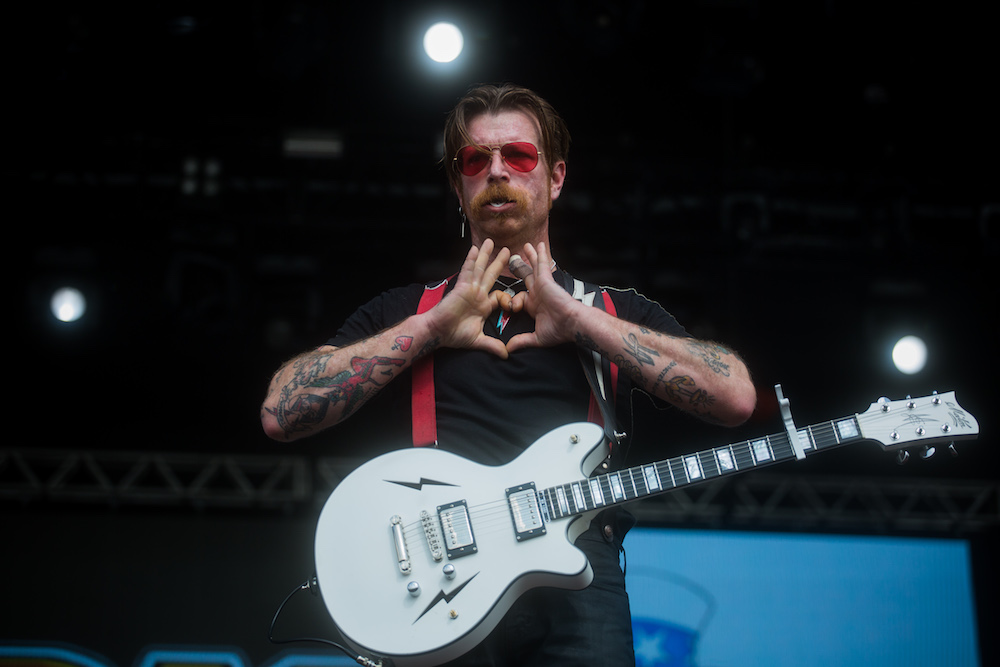On the night of November 13, 2015, Eagles of Death Metal were on stage at Paris’ Bataclan club when terrorist attackers suddenly opened fire on concertgoers. The band’s merch manager and 88 other attendees died; survivors were held hostage for hours. The campy garage-glam band led by Jesse Hughes (previously best-known to fans of Queens of the Stone Age, whose frontman Josh Homme is the Eagles’ drummer) was catapulted into international news. The New York Times misidentified them as a metal act; U2 invited them to perform at their next Paris show. Actor and filmmaker Colin Hanks also decided to make a documentary on the band. Eagles of Death Metal: Nos Amis (Our Friends) was released this past Monday as a co-production between Live Nation and HBO.
Hughes, Homme, and Hanks are friends, and one imagines the band would not have become the subjects of an HBO documentary if it were not for the cruel circumstance that put them in the same room as terrorists. (Homme was not in France that night, and much of his role in the action takes place in the form of a recollected phone call.) In its title and narrative, Nos Amis preaches the cheery gospel of Peace Love Death Metal, the title of Eagles of Death Metal’s lascivious 2004 debut. It also walks a unique line for a rock doc, balancing the weight of the specific horror of the Bataclan tragedy with the band’s career-long commitment to over-the-top badassery. If Hanks appears to achieve that balance, it’s mostly because he decided to excise almost all of the controversy that has followed Eagles of Death Metal since.
Nos Amis begins the night of the Paris attacks, but spends its first 30 minutes recapping what the Eagles of Death Metal once were. We see Hughes’ baby photos; we learn how Homme came to his rescue in high school when he was teased for being a skinny, flute-playing, roller-blading dweeb. Homme refers to Hughes by his nickname, “Boots Electric”; Hughes calls Homme “Baby Duck.” Hughes’ on-screen presence is similar to the macho showmanship he performs on stage. He talks about his dick so often one suspects it’s got a name of its own.
Hughes appears to be the band’s most emotionally volatile member, and listening to Homme describe their working relationship, it’s clear that was true long before the events of November 13. The Eagles’ sex-appeal-and-flame-decal schtick isn’t just a schtick for Hughes, Nos Amis seems to argue. “Cock of the walk” is his real-life persona, too—except in talking about the attacks, where he sounds simultaneously theatric and broken down. “I take it as a holy charge, this duty of leadership that I’ve been elected to by circumstance,” he says early in the film. “I just don’t want to fuck up and do anything wrong by anybody who was there with me… I want rock ’n’ roll to go back to being the way it was, for me.”
It’s an admirable sentiment. The problem is that Hughes already, in his words, fucked up. The timeline of events in Nos Amis ends immediately after Eagles of Death Metal’s return-to-Paris concert in February 2016. In reality, Hughes spent the following 12 months poisoning his public message of love and unity with conspiracy theories and Islamophobia. In March 2016, he began implying that Bataclan security staff were somehow in on the terror plot, comments that eventually got him banned from venue. He apologized, but then doubled down in a later interview, making groundless, distinctly Trumpian claims that he’d seen “Muslims celebrating in the street during the attack.” (He’s since walked back those comments, too.) In another strange turn, TMZ reported last month that an ex-friend of Hughes’ obtained a restraining order after the frontman allegedly knifed a voodoo doll and hung it outside his property.
Hughes’ words are those of a man traumatized, but Nos Amis is another missed opportunity to explain, perhaps, how that trauma led him to make a series of bizarre and defamatory statements he now says he regrets. Back in November, Hanks told Deadline his documentary wouldn’t “walk around” Hughes’ comments. That’s true in exactly once instance: Hanks shows a clip from a tearful interview on the French web broadcaster iTélé just prior to that February 2016 Paris show. In it, Hughes rails against gun control: “Did your French gun control stop a single fucking person from dying at the Bataclan? … Maybe until nobody has guns, everybody has to have them.”
Hughes exits that interview visibly shaken. Nos Amis continues in silence for a minute, as if it’s asking the viewer to meditate on Hughes’ sudden and extreme pro-gun stance. Hanks does not ask a follow-up. (Representatives for Hanks did not respond to SPIN’s request for comment.)
At moments, Nos Amis manages to be entertaining. (Watching Bono re-enact his first impression of the band name like a stoned high school student—”The Eagles, y’know, you think of the Eagles, then I think of death metal”—is great.) But there’s no compensating for the decision to pretend the Jesse Hughes of the past year didn’t happen. The result is an irresponsibly incomplete documentary lacking its would-be dramatic tension: What goes through the mind of a man who experiences the unspeakable and reacts by saying the unthinkable? Hanks and the band appear content to leave that most heavy stone unturned.





